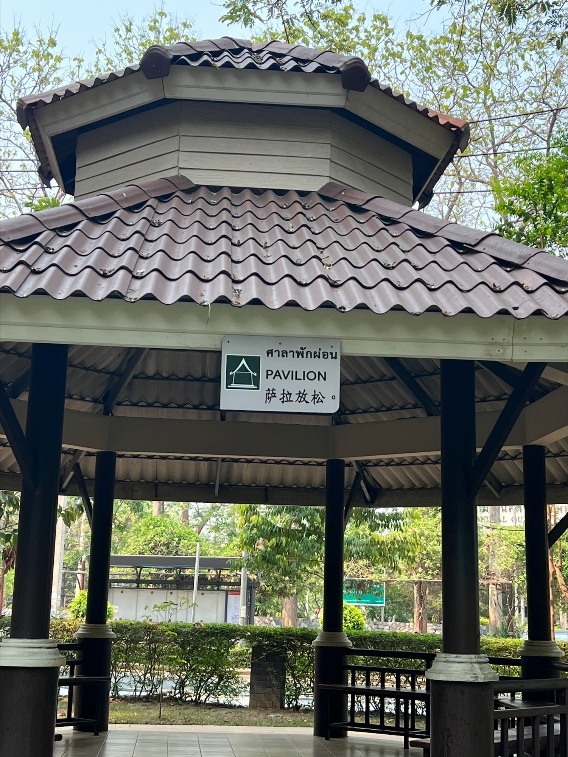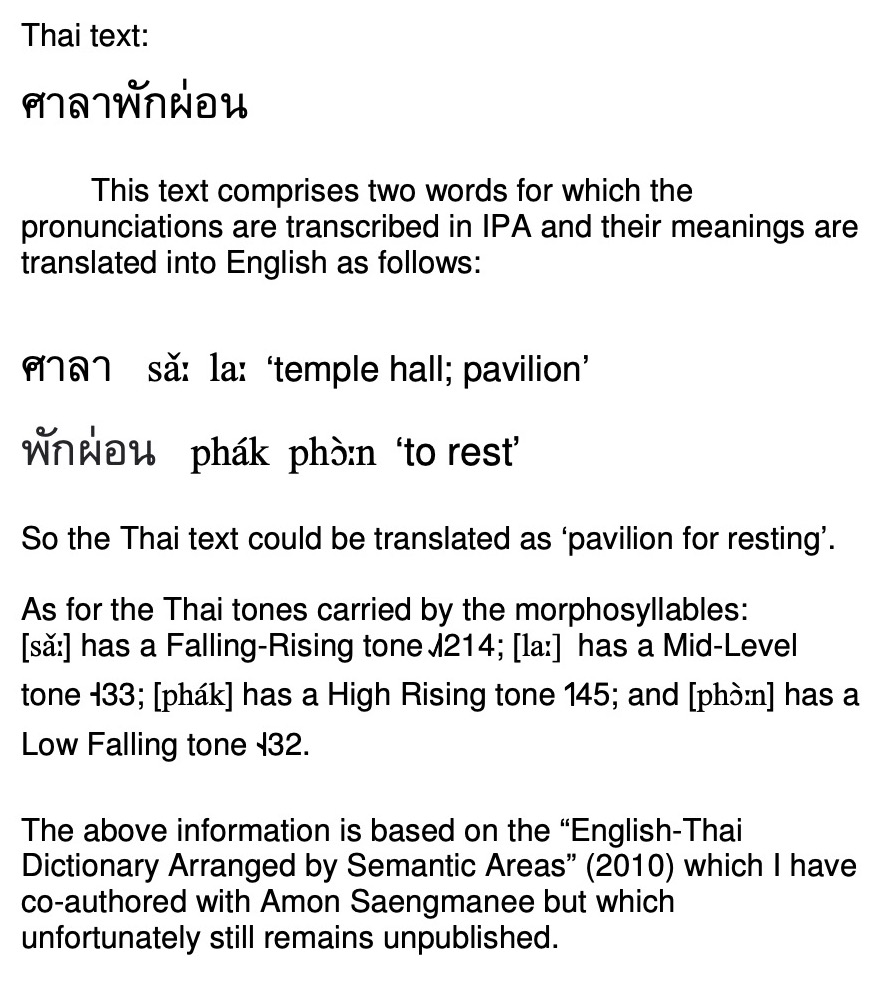Mixed Thai, English, and Chinese sign
« previous post | next post »
Photograph taken at a park in Chiang Mai, Thailand:
In brief (and without marking the Thai tones here), the Thai text comprises two words [sa: la:] ‘pavilion; gazebo’ and [phak pho:n] ‘to rest’, i.e., ‘pavilion for resting’.
Complete transcription and explication of the Thai text by Robert S. Bauer (author of the monumental ABC Cantonese-English dictionary from the University of Hawai'i Press):
VHM: Can Language Log colleagues somehow help Bob get this long lingering and valuable dictionary published?
Explication of the English and Chinese, also from Bob Bauer:
The English text has omitted the second word ‘to rest’. The first Chinese word 萨拉 [sa4 la1] has transliterated the Thai word [sa: la:] and is followed by 放松 [fang4 song1] ‘to relax’, so it is a closer translation of the Thai text.
VHM: The Chinese characters on the sign are in their simplified forms. The traditional forms would be
薩拉放鬆
A closer Chinese approximation of the Thai would be fàngsōng tíng 放松亭 / 放鬆亭.
Selected readings
- "Thailish" (10/15/15)
- "Cabbages & Condoms" (10/13/15)
- "Bur Ger A Head: Thai fondness for English syllabism" (10/13/13)
- "Chicken hegemon" (12/2/21)
[Thanks to Joyce White and Justin McDaniel]


ycx said,
April 12, 2023 @ 12:25 am
"phak phon" looks superficially similar to "fang song". I wonder if there's an etymological connection, like "ji" and "gai" (chicken in Chinese and Thai respectively).
AG said,
April 12, 2023 @ 2:11 am
It's my understanding that "sala" is not native thai but a sanskrit / pali loan word, so i wonder how the cognate was translated into chinese when it came up in sutras or what have you.
https://www.wisdomlib.org/definition/shala
Nhan Hong said,
April 12, 2023 @ 7:16 am
So, Thai and Khmer have some words similar as they originated from Sanskrit or Pali. The word Sa La is the same as Khmer; however the first syllable is reduced into something like a consonant.
daud ali said,
April 12, 2023 @ 9:55 am
I think thai sa la is actually the sanskrit word śālā, meaning hall, shed, house.
Victor Mair said,
April 12, 2023 @ 1:44 pm
From Joyce White:
I have seen "sala" used mostly as a common building type in temples, so it would make sense that it is Sanskrit or Pali derived.
John Swindle said,
April 13, 2023 @ 3:10 am
Not to be confused with 拉萨 'Lhasa' (the city in Tibet).
kmh said,
April 13, 2023 @ 6:53 am
Here's the etymology from the Royal Thai Dictionary (http://www.thai-language.com/id/131802): "ศาลา /สา-ลา/ {Sanskrit:; Pali: สาลา}"; the two definitions given are:
1. Thai-style pavilion; open-air gazebo
2. meeting hall (in a temple)
There are many usage examples at the link, including "ธรรมศาลา: Dharamshala, a city in the Indian state of Himachal Pradesh".
DS Zhang said,
April 14, 2023 @ 4:00 am
Agree with Professor Daud Ali — sa la should be Sanskrit śālā. Library is pustakaśālā ("hall of books"), school is pāṭhaśālā ("hall of reading").
And as for the Chinese, the correct syntax should be "放松萨拉" — if the Thai "sa la" concepts likes to remain transliterated instead of translated. "萨拉放松" is absolutely wrong in the grammatical / syntatical sense. It means, instead, "Relax, Sarah (or anything that sounds like Sa La)!"